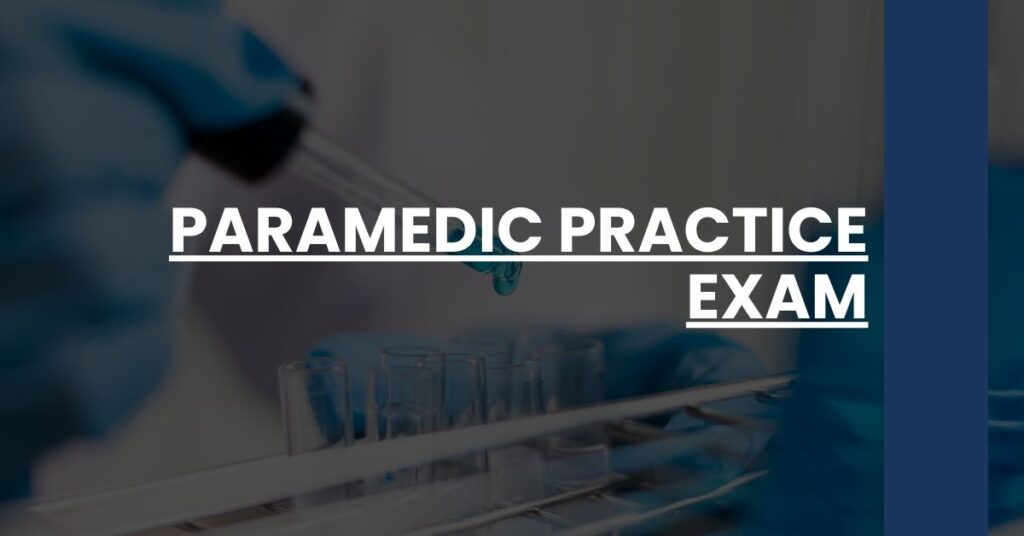Paramedic practice exam prep is crucial to launch a successful career in emergency medical services.
- Exam Structure: Familiarize yourself with the layout and sections of the paramedic exam.
- Study Strategies: Learn effective techniques for retaining vital emergency medical information.
- Test-Taking Tips: Gain insights into navigating questions confidently and efficiently.
Ensure success in your Paramedic practice exam with our expert guidance.
- Understanding the Paramedic Practice Exam
- Importance of the Practice Exam for Aspiring Paramedics
- Key Components of the Paramedic Certification Exam
- Reviewing Essential Paramedic Knowledge Areas
- Analyzing Practice Exam Questions
- Techniques for Successful Test-Taking
- Utilizing Official and Unofficial Study Resources
- Frequently Asked Questions (FAQs) About the Paramedic Practice Exam
- Simulation and Practical Experiences
- After the Practice Exam: Next Steps
- Conclusion: Embark on Your Paramedic Journey with Confidence
Understanding the Paramedic Practice Exam
When you’re gearing up for the Paramedic practice exam, you’re taking a crucial step towards ensuring that, when the time comes, your responses in emergency situations won’t just be second nature – they’ll be second-to-none. This mock exam is a simulated version of the real cognitive exam, designed to mirror the format and the challenging nature of the questions you’ll encounter. Here’s what you need to get familiar with:
Types of Questions Encountered
- Multiple-Choice Questions: These will test your knowledge on topics from pharmacology to cardiovascular emergencies. Starting with familiar questions will build your confidence.
- Scenario-Based Queries: These practical situations evaluate your ability to apply theoretical knowledge in real-life contexts.
- Dynamic Visuals: Some questions come with diagrams or ECG readings to interpret, replicating the visual assessments you’ll face in the field.
Skills Assessed by the Exam
- Medical Knowledge and Application: It’s not just about what you know – it’s how you use that knowledge in critical situations to make the best decision.
- Critical Thinking: Quick thinking is vital. The practice exams will challenge you to make swift, sound judgments.
- Problem-Solving Abilities: You’ll encounter scenarios requiring creative yet clinically sound solutions.
Diving into a Paramedic practice exam is a window into where your strengths lie and what areas require further polish.
Importance of the Practice Exam for Aspiring Paramedics
Without question, the role of practice exams in preparing for the pivotal Paramedic certification test is invaluable. Here’s how these preparatory tests set you up for success:
- Confidence-building: Familiarity reduces anxiety, letting you focus on the substance over the form during the actual exam.
- Time Management: Hone your ability to allocate your time effectively across questions, ensuring you’re not left short as the clock ticks down.
Consistently engaging with practice exams will leave you with an actionable insight into your preparedness, allowing you to refine your approach before the big day. Remember, comfort and success in the Paramedic certification exam go hand in hand.
Key Components of the Paramedic Certification Exam
Navigating the Paramedic certification exam can seem daunting without understanding its makeup. Key components include both cognitive and psychomotor exams, each designed to vet your readiness for the complex demands of pre-hospital advanced life support care.
Cognitive Exam Breakdown
- Airway, Respiration, and Ventilation: Expect to face questions on breathing management and intervention skills.
- Cardiology and Resuscitation: Here, your emergency cardiovascular care and resuscitation knowledge will be tested.
- Trauma: You must demonstrate how to assess and manage various traumatic injuries.
- Medical and Obstetrics/Gynecology: This includes knowledge on medical emergencies, pediatrics, and obstetric scenarios.
- EMS Operations: Questions concerning the operational aspects and safety of emergency medical services are also included.
The cognitive exam, as outlined by the National EMS Certification Exam, is not just a test of memory – it’s an assessment of your capacity to deliver under pressure.
Psychomotor Exam Prerequisites
- Real-World Simulations: In-person scenarios will test your practical skills, from patient assessment to managing traumatic injuries.
- Team Dynamics: Working with others in simulated emergencies gauges your ability to perform as part of a team.
Understanding the dual nature of these exams is your first step towards honing the skills and knowledge necessary for success.
Reviewing Essential Paramedic Knowledge Areas
Mastering key knowledge areas is integral to your success on both the practice and actual certification exams. Key content to focus on includes:
- Patient Assessment and Management: Learning to conduct thorough patient evaluations, including history taking, physical exam, and clinical decision making.
- Pharmacology: A firm grasp on the medications commonly used in emergency care is essential.
- Cardiology: Recognize and treat cardiac emergencies effectively.
- Airway and Breathing Management: Know techniques to establish and maintain airways in critical situations.
- Legal Aspects of EMS: Understand the legal ramifications of medical intervention.
Integrate core paramedic knowledge, like initiating appropriate triage and managing size-up situations, into your study sessions, and you’ll not only pass, but also excel.
Analyzing Practice Exam Questions
Understanding the nuances of Paramedic practice exam questions is like decoding a map before starting a journey. This isn’t just about knowing the territory; it’s about charting the best possible course. Let’s delve into the strategies that can make a difference.
Types of Questions You’ll Face
- Multiple-Choice Structure: Often, these questions offer one correct answer out of four options, testing your recall and understanding of medical knowledge.
- Prioritization Questions: These make you choose the ‘best’ or ‘most correct’ answer, essentially a test of your prioritizing skills in urgent situations.
Navigating these questions effectively means interpreting them not just at face value, but for the underlying clinical concepts they assess. Hone your skills with sites like Test Guide to get a sense of the timing and develop strategies for tackling different question types.
Approaching Complex Scenarios
- Scenario-Based Practice: Stepping through the shoes of a paramedic in a written scenario helps you mentally prepare for real-world applications.
To thrive, you should be adept at reading beyond the text––discerning what is implied just as well as what is explicitly stated. Approach each question methodically, ensuring that you comprehend the full scope of the presented challenge.
Techniques for Successful Test-Taking
Managing the pressure during the paramedic practice exam is half the battle won. Here are several tried-and-true methods aimed at optimizing your performance:
Pacing Yourself
- Keep an Eye on the Clock: Allocate your time to each question intelligently, ensuring you’re not left scrambling as the countdown continues.
Deconstructing Questions
- Break Down the Question: Identify key phrases and words that hint at the underlying focus of the question.
- Eliminate the Obvious: Weed out any clearly incorrect choices before zeroing in on potential right answers.
Adopt these strategies and consider tools like the MedicTests simulator for a realistic test experience that mirrors the rigors of the actual exam environment.
Utilizing Official and Unofficial Study Resources
The vast expanse of study resources available could be overwhelming. Let’s cut through the noise and point you towards the materials that make a difference.
Recommended Resources
- Official Textbooks: Foundationally, the knowledge here is invaluable.
- Online Practice Exams: These offer a taste of the real thing; use them to gauge your exam readiness frequently.
Resources such as Mometrix’s Paramedic Study Guide include comprehensive videos, flashcards, and practice questions that align with your learning style, helping you reinforce crucial concepts.
Frequently Asked Questions (FAQs) About the Paramedic Practice Exam
Common Queries Answered
- How Close Is the Practice Exam to the Real Thing? They simulate the format and rigor of the actual exam, preparing you for what’s to come.
Delve into reliable sources like Test Guide to understand the significance of the practice exam and get answers to any perturbing questions.
Simulation and Practical Experiences
It’s critical to bridge the gap between theoretical knowledge and practical applicability. Here’s how simulation can enhance your preparedness:
The Power of Hands-On Practice
- Realistic Scenarios: Simulation affords you the opportunity to apply learned principles in lifelike settings without real-world consequences.
Harness resources like MedicTests to experience scenarios that push the boundaries of your clinical reasoning and technical skills.
After the Practice Exam: Next Steps
Taking a practice exam can be humbling, but the true test of your character lies in how you respond to its revelations.
Improving Post-Exam
- Analyze Your Results: Look beyond the score—understand why each answer is correct or where you faltered.
- Refine Your Techniques: Use this feedback to adapt your study approach, focusing on the areas that need strengthening.
Use feedback to continually refine your study habits, ensuring that when it comes time for the real Paramedic practice exam, you’re at the zenith of your preparedness.
Conclusion: Embark on Your Paramedic Journey with Confidence
Stepping into the world of paramedic practice with the right preparation sets the tone for your performance not only on the exam but throughout your career. Embrace each challenge as a stepping stone towards mastery and approach your study sessions, practice exams, and, ultimately, the certification exam with a blend of confidence and humility. The journey to becoming a paramedic is rigorous and demanding, but with diligent preparation and a composed mind, you’ll navigate this path successfully. Your future self – and the countless individuals you’ll one day assist – will thank you for the effort you put into acing your Paramedic practice exam today.

